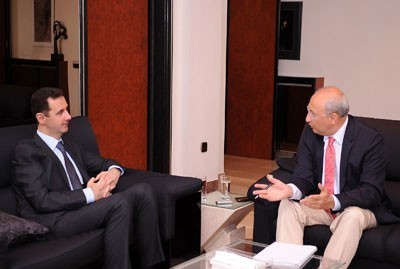
President Bashar al-Assad stressed in part 3 of the interview he recently gave to the Cumhurieyt Turkish daily that the crisis in Syria is mostly external and the evidence of that is the presence of Arab and extremist Islamist militants now fighting in Syria as well as the advanced weapons that are being smuggled across the border and the flow of money from the outside.
Journalist: You are trying to distinguish between the Turkish government and the Turkish people, but there are different opinions in Turkey about what is happening in Syria. There are those who believe that the Syrian regime is making mistakes, killing tens of innocent people and children daily. What are your comments on that, and what is the truth about the relationship between President Bashar al-Assad and the Syrian people?
President Assad: In order to verify the facts, let’s take real examples of what is happening in our region. One of the best examples is your direct neighbor, the Shah of Iran. He used to have a very strong state, a very strong army, very strong intelligence services, international support, and of course, unlimited regional support. Was he able to stand in the face of the people? Naturally, he was unable to do that. If I were in that position, I wouldn’t have been able to do that. You are talking about fifteen months, not two or three weeks, or even a month. All the betting and wagering has fallen. It is absolutely clear now that the largest part of the crisis is driven from the outside, and the evidence is the existence of Arab fighters and extremist and Islamist fighters fighting in Syria now. Moreover, there is the sophisticated weapons being smuggled through the borders, and the money being sent from abroad. This has actually changed the convictions of many people inside Syria, both among the opposition and the supporters of the government. The Syrians are defending their country now. The revolution cannot be a revolution of gangs. It should be a revolution of the people; and no one can suppress the revolution of the people. Now, you are in Syria, and you can go and walk about anywhere in order to see whether there is a revolution or not. We are seeking and killing terrorists and defending ourselves. They are perpetrating massacres against civilians, and it is our duty to defend civilians. It is our duty as a state. What would you do, as Turks, when you are killed? Don’t you defend yourselves? Don’t you justify all your military operations in northern Iraq and in Turkey under the title of fighting terrorism? Do we say that the Turkish state is killing its people in this case? These are double standards, and this is political hypocrisy which we do not accept.
Journalist: Do you regret that you suppressed the first peaceful demonstrations last year?
President Assad: There is a certain margin of error, of course, in every action. This is self evident. We are humans, and we might err or do the right thing. But we should distinguish between the mistakes made inside Syria and the foreign factors. The plot against Syria went through three stages. In the first stage, there were demonstrations, and a large part of these demonstrations was paid for. At the beginning of the crisis, a demonstrator used to be paid ten dollars. Now, they are paid fifty or a hundred dollars depending on the region. But they expected that a real revolution could come out of these demonstrations, peaceful demonstrations like those which happened in Egypt and Tunisia. Until last Ramadan, they failed in that stage. After that, they started to plan for creating certain regions in Syria dominated completely by armed gangs, like what happened in Benghazi in Libya. The army fought this attempt which lasted until last March, when they failed in the second stage. Then they shifted focus to individual assassinations, committing massacres against civilians, in addition to attacking state institutions with explosive devices. In other words, it would be naive to say that those demonstrations were peaceful. They were not exactly like that. At any rate, demonstrations still happen from time to time but in smaller numbers, and mostly they are paid for.
Journalist: The UN Human Rights Council, in its most recent report, held the Syrian army responsible for the largest part of the bloody events taking place in Syria. How do you comment on that?
President Assad: All of us know that the international institutions are dominated by the American administration and the west in general; and it would be stupid to consider what these international organizations say a point of reference about reality. They only express the balance of international powers; and the objective in the end is to put more pressure on Syria, and the more they fail in implementing their plans, the more pressure they put on Syria. But as long as we are doing the right thing, we will never succumb to international organizations or to anyone else.







